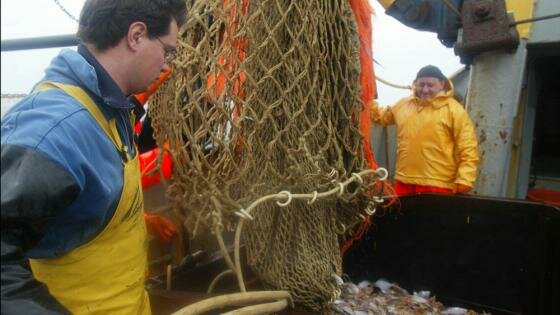Overfishing is a global problem with environmental, economic and social impacts. On the occasion of the International High Level Conference on fishing capacity, held on 13-14 March in Thessaloniki, the Greek presidency web team interviewed Mrs O. Armeni, Fisheries Biologist, advisor to the Minister of Rural Development and Food, Athanasios Tsaftaris.
Q : What is the Common Fisheries Policy and what are the reasons for its revision?
A : The Common Fisheries Policy is a framework of rules relating to the fisheries management of EU Member States. Its objective is to ensure the long-term environmental, economic and social sustainability of fisheries and aquaculture sectors.
However, the fishing industry is facing an uncertain future, as well as the alarming status of marine resources, as EU vessels continue to fish at rates that do not allow for the adequate renewal of populations through reproduction. To that end the EU has revised its Common Fisheries Policy in order to achieve a sustainable development, create new employment opportunities in coastal areas and, eventually, guarantee consumers the supply of healthy fish stocks as a result of sustainable fishing.
Q : What are the results so far of the implementation of the Common Fisheries Policy? What can be expected in the future?
A : Today, there is no scientific advice on the current situation of 60 % of fish stocks. The way these had been managed in the period 2003-2010 indicates that the fishing capacity which had been approved by the relevant Council exceeded by 40 % the scientific advice. According to scientific estimates to date, fishing discards account for 23% of total fisheries production, meaning that 1.7 million tons of fish per year are thrown back into the sea.
Moreover, during the last decade more than 30 % of jobs in the fisheries sector have been lost and young people are not interested in entering the industry, while more than 65 % of fish products in the EU is imported.
Based on the implementation of the revised fisheries policy, in particular by following the principle of “maximum sustainable yield”, it is expected that at least 80 % of stocks will be caught according to this principle (that is, “maximum sustainable yield”) by 2020. The stock size is estimated to increase by 15 million tons and production by 500,000 tons, while the number of jobs will rise by 30% by 2022.
Q : How will the European Maritime and Fisheries Fund help in achieving these goals?
A : The new Fisheries Fund (European Maritime and Fisheries Fund ), with a budget of € 6.4 billion for the period 2014-2020, supports, as a priority, small and medium-sized enterprises
Financial support is envisioned for the renewal of stocks, the gradual prohibition of discards, the strengthening of aquaculture, innovation and practices aimed at environmental conservation and the promotion of measures for small-scale coastal fisheries and young fishermen. In addition, the Fund supports activities of the Integrated Maritime Policy, the data collection for fisheries and the monitoring of fishing activities, as well as the processing and marketing of fishery products.
In addition, actions such as the engine replacement and the modernization of the fleet with new equipment in order to improve health and safety conditions on board, as well as the definitive and temporary cessation of fishing activities are covered.
Q: How are resources allocated to Member States?
A : The allocation of resources among Member States takes into account, inter alia, criteria such as the sector employment, fisheries and aquaculture production and the participation of small scale fisheries in the fleets. This way, the EU hopes to improve the situation in the fisheries sector and to achieve a level playing field for fishermen in the Member States.
Q : Is the problem of depleted stocks and over- capacity of EU only or wider concern?
A : The problem is much wider, it is global, and requires concerted action. In this context, the High Level International Conference on fishing capacity is taking place in Thessaloniki, on 13-14 March, aiming at getting international stakeholders in the management of fishing capacity to take more action. To this end, a Joint Declaration is to be signed by participants, particularly countries with a significant interest in fisheries, including EU, the U.S.A., Japan, Indonesia and possibly Morocco and Colombia.
This Declaration is a political commitment of the signatories and is supported by already approved policies. Thus, countries outside the EU will be enforced to comply and take measures to address the problem of overcapacity.








